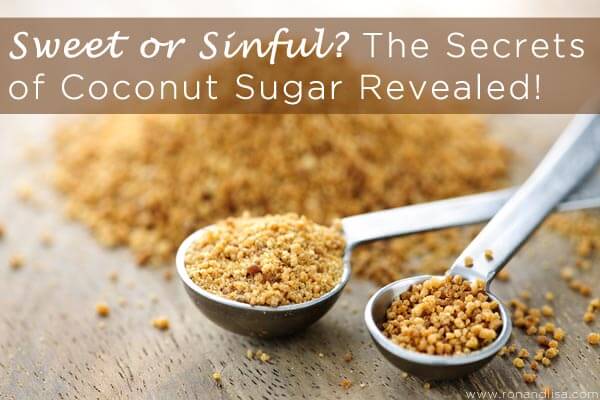Since February is the sweetest month, I thought fitting to start a discussion about something us moms are always concerned about….sugar! As a chef with an affinity for baked sweets, sugar -in all its forms – is near and dear to my heart. But, like any smart parent, I am concerned with the health ramifications of too much sugar in me and my family’s diet. I’d like to start this month with an exploration of coconut sugar. Coconut sugar is the latest darling in the “natural sugar” movement. You may have heard the hype: It’s a miracle sugar! It’ll to cure cancer! Coconut sugar will bring about world peace.
Umm… not so fast.
What is Coconut Sugar?
Coconut sugar is produced from the nectar of coconut flower buds. The buds are cut open and the sap is collected; then boiled, reduced, and dried. The result is a caramel-colored sugar that has similarities to brown sugar. The process is similar to the one that produces maple syrup. Sounds yummy, right?
All forms of Sugar Purchased in the Store are Concentrated Forms of Natural Plant Sugars
This is true whether they are derived from maple trees, sugar cane, sugar beets, flower nectar (honey), agave plants, or coconut palms. By the time we buy these sugars in the store, they are fairly similar — they are all mixtures of sugars (fructose, sucrose and glucose), with approximately 16 calories and 4 grams of sugar per teaspoon. Coconut sugar is no different.
The Main Health Claim of Coconut Sugar is That it Doesn’t Raise Blood Sugar as Much as Other Sugars
This is ranked on the glycemic index. What’s the glycemic index? The glycemic index is a measure of how quickly blood glucose levels (i.e. blood sugar) rise after eating a particular type of food. Coconut sugar contains a fiber called Inulin, which may slow absorption and explain why coconut sugar has a lower glycemic index than regular table sugar. In fact, there is a report by the Philippines Food and Nutrition Institute which has been widely linked to which states that the glycemic index of “coconut sugar prepared by the Philippine Coconut Authority” was calculated to be 35, based on the results from 10 test subjects. For reference, table sugar hovers around 60. Unlike many natural sweeteners, regular table sugar and high fructose corn syrup don’t contain any vital nutrients and therefore supply “empty” calories. Coconut sugar, however, does retain quite a bit of the nutrients found in the coconut palm. There isn’t a lot of data on this, but according to the Philippine Department of Agriculture, coconut sugar contains several nutrients such as Iron, Calcium, and Potassium.
Quick Sugar Facts:
- Sucrose, the sugar in regular table sugar is made up of roughly 50% fructose and 50% glucose. This is one of the reasons excess table sugar is so bad for you.
- Our bodies are equipped to process glucose – it’s what we use to store and make energy.
- Our bodies don’t do very well processing fructose. Excess fructose is very hard on the liver since it’s the livers job to process the sugars that come through. Fructose has been linked to insulin resistance, fatty liver disease and obesity.
- Coconut sugar, despite internet claims otherwise, also has quite a bit of sucrose, anywhere from 70%- 80%.
- Since sucrose is made up of half glucose and half fructose that means that coconut sugar can be almost 50% fructose (perhaps not the miracle sugar it claims to be)?
So what’s a health minded person to do with all of this information? I’m a big believer in objectivity, so I always look at the latest and greatest of anything with skepticism. Glycemic index findings can vary greatly between individuals and this study included only 10 people. Glycemic index can also vary between different batches of food; meaning that products from other manufacturers might have slightly different effects. Couple this with the fact that the Philippines Food and Nutrition Institute has a direct interest in the marketing and export of their coconut sugar. Some might call this a conflict of interest.
Most nutrition experts will tell you to watch the amounts of sugar in your family’s diet. Consumed in excess, added sugars will cause numerous problems such as: metabolic syndrome, obesity, diabetes and cardiovascular disease. In my opinion, the jury is still out on coconut sugar. Until I see more science, I think the smartest choice right now is to treat coconut sugar like any other added sweetener, use it minimally and save it for special occasions. Perhaps not a catalyst for world peace, but a delicious addition to your morning oatmeal!




Amazing info about coconut palm sugar. It is very sweet and nutritious. Coconut sugar is produced from the nectar of coconut buds. The buds are cut open and sap is collected. The sound of coconut palm sugar is so yummy. Thanks for sharing.